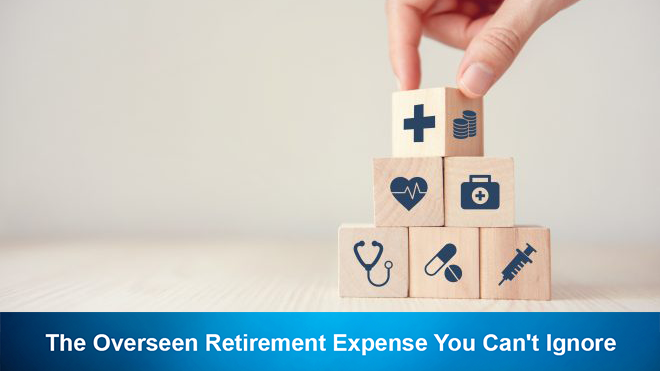One of the biggest retirement planning mistakes you can make is not knowing how much money you will need to live comfortably. Don’t get caught off guard by this one often-overlooked expense that could be detrimental to your retirement.
If you are like most pre-retirees, health care is expected to be one of your largest expenses in retirement – after housing and transportation costs. But unlike older generations, you probably don’t have access to employer- or union-sponsored retiree health benefits. So, health care costs will likely consume a big portion of your retirement budget.
Planning for this often-overlooked expense is essential in order to be fully financially prepared for your golden years.


According to the Fidelity Retiree Health Care Cost Estimate, an average retired couple age 65 in 2020 may need approximately $295,000 saved (after tax) to cover health care expenses in retirement. Of course, the amount you’ll need will depend on when and where you retire, how healthy you are, and how long you live.
Even with Medicare coverage, seniors still incur substantial out-of-pocket costs. EBRI projects that a couple who are Medicare beneficiaries and want to be confidently prepared for the higher end of prescription drug costs would need to have $368,000 in savings to cover premiums, deductibles, and other out-of-pocket expenses.
The amount you need will also depend on which accounts you use to pay for health care, your tax rates in retirement and perhaps your gross income.


As daunting as these expenses seem, there are some steps to take to mitigate their effect and lessen the risk that they will derail your retirement.
It’s time to start asking questions! When enrolling on a retiree healthcare plan, ask these important questions — with answers you’ll find at the Social Security and Medicare sites.
- When am I eligible?
- What are my choices?
- How do I choose my Medicare supplement options?
- What do the plans cost?
- When and how do I sign up?
Once you’ve addressed these key questions it’s time to take further control of healthcare costs. Obviously taking care of your health and finances are going to drastically help, but by asking yourself and your provider further questions, you could hugely reduce your healthcare costs.
A key example being “Do I need this test?”. Doctors don’t always consider the costs of tests, but you can’t afford not to. A doctor should be able to explain how a test is going to help either diagnose or treat you; if they can’t, it’s worth digging into whether the test is necessary.
The same goes for medication: It’s well within your rights as a patient to find out why you need a particular medication and what other — potentially cheaper — alternatives exist, including diet and lifestyle changes.


There’s a lot to learn about the world of Medicare. You’ll need to know about Medicare Parts A, B, and D, as well as Medicare Advantage and “Medigap” supplemental insurance plans.
Medicare Vs Medicaid
What’s the difference?
Medicare is a federally funded health insurance program. The program primarily covers people who are either age sixty-five and over or disabled, regardless of income. There is a monthly premium for non-hospital coverage, and patients also pay part of the costs through deductibles, copayments, and/or coinsurance.
Medicaid is a health assistance program jointly funded at the federal and state levels. The program supports low-income individuals and families, regardless of age. The income eligibility requirements vary from state to state. Patients typically do not pay anything toward covered medical expenses.
Medicare Parts A, B, C, and D
Medicare coverage is divided into four main parts:
- Medicare Part A: Medicare Part A is known as hospital insurance as it covers hospital expenses like inpatient hospital stays, skilled nursing facility care, and hospice.
- Medicare Part B: Medicare Part B is known as medical insurance as it is an extension of the hospital and medical supply/equipment insurance provided by Part A. Part B of Medicare covers preventative care, doctor visits, lab work, and outpatient services such as physical therapy.
- Medicare Part C: Medicare Part C is commonly known as Medicare Advantage. At a high level, Part C provides an alternative to Parts A and B and usually eliminates the need for Medigap insurance. (Medigap insurance is a commonly selected option for those with Parts A and B. Medigap covers some on the holes in Medicare coverage). Part C is offered through private companies that contract with Medicare to provide Part A and Part B benefits.
- Medicare Part D: Medicare Part D is the newest part and it covers prescription drugs for those who choose to purchase this part through the payment of monthly premiums. Like Medicare Part C, Part D is offered through private companies that contract with Medicare.
Like all insurance policies, there are variations in terms of deductibles, and excluded from coverage are long-term care services, vision services, dental care, and hearing aids.

Although health care costs continue to rise, there are financial planning steps that you can take today to help prevent health care costs from eating into your retirement lifestyle. It’s important to have a written financial plan for retirement. That plan should consider rising health care costs, as well as your longevity and when you plan to retire.
If you are approaching retirement, the best way to plan for future medical expenses is to build up your financial reserves. If you are unsure how much money you’ll need, start by creating a retirement budget that includes realistic estimates of your medical expenses and see how they stack up against your savings. Depending on the progress you have made so far, you may need to increase your savings rate to cover the difference.
Additionally, talk to a retirement income financial advisor at CKS Summit Group about your overall financial plan. Although many expenses in retirement are uncertain, the earlier you start planning, the more likely you are to achieve the financially secure retirement you desire.
AT CKS Summit Group, we design, build, and manage custom retirement portfolios that are fully capable of simultaneously generating stable growth, increasing income, and preservation of principal throughout a client’s lifetime, with only limited downside market risk. Don’t let the worry of healthcare costs and your retirement income keep you up at night. Contact us today by calling 586-286-5820 or click here to set up your complimentary strategy session.



